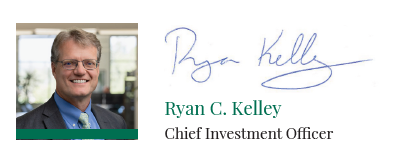Market Myopia: Tough Beginnings & Fantastic Finishes
Chief Investment Officer, Ryan Kelley, describes "market myopia" and the eight technology giants' effect on returns in 2023. He reinforces that time in the market and staying mindful of downside risk remains relevant and he believes the outlook for U.S. stocks remains positive.
-
 Ryan C. Kelley, CFAChief Investment Officer and Portfolio Manager
Ryan C. Kelley, CFAChief Investment Officer and Portfolio Manager
During an interview this summer, I was reminded how important it is to maintain a long term view of the market and investing and how easy it is to focus on the very recent past. In mid-July, when the Nasdaq Composite Index was soaring to new 2023 highs and large cap tech was once again dominating both returns and news headlines, the interviewer seemed confused—and somewhat disappointed—when I mentioned that even with 2023’s stellar performance, the Nasdaq was negative if you included the prior year (2022) and that during that same time, utilities had outperformed. As of the time of writing this letter, a similar story can be seen when considering eight technology giants: Microsoft, Tesla, Facebook (Meta), Apple, Amazon, Netflix, Nvidia, and Google, or “MT. FAANNG” as a much easier to say (and remember) acronym.1 MT. FAANNG is up on average a whopping 89.69% in 2023 on a total return basis as of November 7, 2023. However, this same group was down -46.71% in 2022, a dismal year for large-cap tech. Due to the unforgiving nature of percentages, from the end of 2021 until now, this group of highflyers, believe it or not, is still down -3.14% on average, despite an incredible 2023.
I like to call this phenomenon “market myopia.” Investors tend to be optimists, as am I. This makes it so much more comforting to forget the “tough beginnings” when you’d rather remember the “fantastic finishes.” In continuing with the example above, unless you were an investor with prescient foresight, you likely didn’t sell all your MT. FAANNG stocks on January 4, 2022, as the market started its correction, and you probably didn’t then buy them all back on September 30, 2022, when the market hit its low. An average investor’s experience would be much different than that. Which brings me to the point of all this: what are some elements of our investment philosophy here at Hennessy Funds?
First, what about timing the market? Simply put, we don’t do it. As Neil Hennessy, our Chief Market Strategist and long-tenured Portfolio Manager, aptly put it, “It’s not about timing the market, but rather about time in the market.” The long-term annualized return of the market, as measured by the Dow Jones Industrial Average going back 104 years to 1920, is about 9.6%, and that number would be closer to 7-8% on a real return basis when factoring in inflation. If an investor is poorly timing when to enter and when to exit the market, it would be very difficult to achieve similar, attractive returns to what they would experience simply by staying invested through a complete market cycle.
We are optimistic investors. We understand that some years or months may be tougher than others, but we tend to think in longer timeframes. An investor solely invested in the Nasdaq might have looked at their portfolio at the end of 2022 and been extremely disappointed with a -32.51% return. But as Josh Wein, one of our Portfolio Managers with over 25 years of experience, pointed out, “2022 was what 8% real returns look like.” In other words, with the year prior (2021) providing a +22.21% return and the year after (2023) hitting a +31.21% return, 2022’s dismal performance of -32.51% created an annualized total return for the Nasdaq of 8.22% over the entire period (December 31, 2020, to November 7, 2023). Josh simply observed that while corrections happen over the course of a market cycle, it’s best not to panic by selling when stocks are hitting new lows.
Downside protection is relevant. While we normally remain fully invested within our individual funds, we seek to reduce risk through other means, including sector diversification and investing in companies that exhibit strong fundamentals at compelling valuations. Dave Ellison, the long-tenured Portfolio Manager of our two financial funds, consistently reminds us, “Losing less money in difficult markets is more important than making the most in rising ones.”
Finally, we are investors in companies, not traders of stocks. Many of our portfolios hold certain positions for long periods of time, a demonstration of the Portfolio Managers’ convictions. In fact, both the Hennessy Focus Fund and the Hennessy Large Cap Financial Fund have held some positions for 25 years or more. We recognize that much of the performance of the Hennessy Funds comes from the actual stocks we own (stock selection) and not from our weightings within certain sectors (sector allocation). Moving in and out of sectors can enhance performance, but it can also hinder it in the same way as market timing, and it takes a significant number of correct “calls” regarding the macro-environment. We’d rather invest long term than rely on lucky calls. Our highly experienced energy funds Portfolio Manager, Ben Cook, summed up our philosophy on the macro environment nicely: “While macro-economic trends help to inform our investment process, ultimately it’s the individual stocks with solid fundamentals and attractive valuations that, over time, drive positive risk-adjusted returns for our funds.”
We are long term investors, staying ever mindful of downside risk while striving to participate in the upside, with each individual fund having its own objective, process, portfolio construction, and investment criteria.
We believe that the outlook for U.S. stocks remains positive, primarily as we believe that the Federal Reserve may be done, or close to done, raising interest rates. Inflation has shown signs of easing, creating a better environment for consumers as well as businesses. The unemployment rate remains near record lows, there are elevated levels of cash on the balance sheets of U.S. companies and in the pockets of many consumers and investors, and there is the prospect of a more dovish Federal Reserve heading into 2024. However, we are cautiously watching certain parts of the economy for any hints of weakness, including consumer spending and credit issues. While volatility and uncertainty may impact the markets, we encourage investors to stay the course, maintain a diversified portfolio, and keep a long term perspective.
We thank you for your continued interest in our Funds and are grateful that you have chosen to invest with us. If you have any questions or would like to speak with us directly, please call us at (800) 966-4354.
Best Regards,
- In this article:
- Overall Market
- Cornerstone Growth Fund
- Focus Fund
- Cornerstone Mid Cap 30 Fund
- Cornerstone Large Growth Fund
- Cornerstone Value Fund
- Total Return Fund
- Equity and Income Fund
- Balanced Fund
- Energy Transition Fund
- Midstream Fund
- Gas Utility Fund
- Japan Fund
- Japan Small Cap Fund
- Large Cap Financial Fund
- Small Cap Financial Fund
- Technology Fund
You might also like
-
 Market Outlook
Market OutlookStaying Disciplined, Finding Opportunity
 Ryan C. Kelley, CFAChief Investment Officer and Portfolio ManagerRead the Commentary
Ryan C. Kelley, CFAChief Investment Officer and Portfolio ManagerRead the CommentaryAgainst a backdrop of dominance of large-cap technology companies and artificial intelligence (AI), Ryan Kelley, Chief Investment Officer, shares his views on compelling opportunities that offer a favorable setup for long-term investors.
-
 Market Outlook
Market OutlookThe More Things Change, the More They Trade the Same
 Neil J. HennessyChief Market Strategist and Portfolio ManagerRead the Commentary
Neil J. HennessyChief Market Strategist and Portfolio ManagerRead the CommentaryAlmost 50 years in the market taught me one truth: the headlines change, the patterns don’t.
-
 Market Outlook
Market OutlookHennessy Funds 2025 CIO Roundtable
 Neil J. HennessyChief Market Strategist and Portfolio Manager
Neil J. HennessyChief Market Strategist and Portfolio Manager Ryan C. Kelley, CFAChief Investment Officer and Portfolio Manager
Ryan C. Kelley, CFAChief Investment Officer and Portfolio Manager Ben Cook, CFAPortfolio Manager
Ben Cook, CFAPortfolio Manager Masakazu Takeda, CFA, CMAPortfolio ManagerRead the Commentary
Masakazu Takeda, CFA, CMAPortfolio ManagerRead the CommentaryHennessy Funds’ Portfolio Managers recently gathered for our annual CIO Roundtable. For the 11th year in a row, they discussed the latest market trends, shared insights, and explored strategies for navigating the ever-changing investment landscape.

